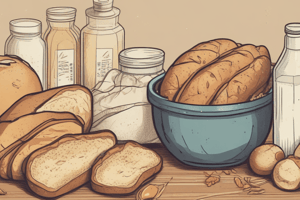Podcast
Questions and Answers
What is the primary reason for controlling final dough temperature in breadmaking?
What is the primary reason for controlling final dough temperature in breadmaking?
- To prevent enzymic actions in the dough
- To ensure consistency of product quality (correct)
- To reduce oxidation in the dough
- To enhance yeast activity
What happens to enzymic activity as the temperature rises in fermenting dough?
What happens to enzymic activity as the temperature rises in fermenting dough?
- It becomes inhibited
- It remains constant
- It decreases gradually
- It increases (correct)
What is the effect of lower temperatures on dough in terms of oxidation?
What is the effect of lower temperatures on dough in terms of oxidation?
- It decreases oxidation (correct)
- It eliminates oxidation
- It increases oxidation
- It has no effect on oxidation
What happens to the rheology of the dough if the temperature at the end of mixing varies?
What happens to the rheology of the dough if the temperature at the end of mixing varies?
What is the effect of higher temperatures on dough during mechanical moulding?
What is the effect of higher temperatures on dough during mechanical moulding?
What happens to the dough if the temperature is raised too high?
What happens to the dough if the temperature is raised too high?
What is the effect of variations in dough temperature on dough volume at the end of proof?
What is the effect of variations in dough temperature on dough volume at the end of proof?
Can a well-controlled prover environment compensate for variations in dough temperature?
Can a well-controlled prover environment compensate for variations in dough temperature?
Flashcards are hidden until you start studying
Study Notes
Importance of Dough Temperature Control
- Controlling final dough temperature is crucial for product quality consistency, regardless of the breadmaking process used.
- Almost all chemical and biochemical processes in breadmaking are temperature-sensitive.
Enzymic Actions and Temperature
- Enzymic activity increases with rising temperature, but maximum activity temperature varies depending on the enzyme.
- Complex series of enzymic actions occur in fermenting dough, and all are temperature-sensitive.
Temperature Effects on Dough Properties
- Lower temperatures result in less oxidation, leading to dough with reduced ability to retain gas and lower bread volume.
- Variations in dough temperature affect dough rheology, making it more or less viscous and easier or harder to deform.
- Temperature affects mechanical moulding, with higher temperatures resulting in less moulder damage.
Temperature Sensitivity in Breadmaking
- Gas production by yeast is temperature-sensitive, influencing dough volume at the end of proof.
- Even in a well-controlled prover environment, variations in dough temperature cannot be compensated for.
- Variations in proof volume cannot be fixed by changing proof time, leading to variations in bread volume and quality.
Optimal Dough Temperature Choice
- The ideal dough temperature depends on the breadmaking process used.
- Higher dough temperatures are used with no-time doughs than those with bulk fermentation or significant processing times.
Critical Control Point
- Temperature control is the single most critical control point in the bakery.
Studying That Suits You
Use AI to generate personalized quizzes and flashcards to suit your learning preferences.




